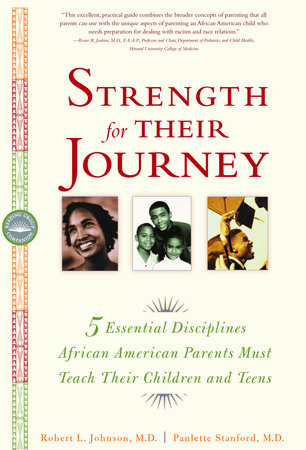Strength for Their Journey Reader’s Guide
By Dr. Robert L. Johnson Dr. Paulette Stanford


1. What would you list as the most critical skills and attributes a young African American needs to succeed, both in society and as a person?
2. What steps should African-American parents take to help children feel good about themselves and their heritage?
3. Do you believe it’s necessary to set a positive example in your actions, or do you think it’s enough just to talk to your child about doing what’s right?
4. What do you think is the most effective approach to disciplining children: strict, lenient, or balanced?
5. Do you think it’s important for African-American parents to talk to children about racial prejudice and offer guidance about how to deal with it?
6. Given the choice, would you prefer to raise your family in a mostly white, primarily black, or racially mixed neighborhood?
7. If your teen started to date someone of a different race, would you allow things to run their course or take steps to put an end to the relationship?
8. Are you aware of the added pressures black students often face in achieving academic success—and what parents can do about them?
9. Do you feel that a higher education is more or less important for African Americans?
10. Do you feel that a historically black college is a better choice for most African Americans than an institution in which most of the students are white?
11. Do you believe parents should shoulder the primary responsibility for educating young people about the dangers of substance abuse and unsafe sex?
12. If you thought your child was either being bullied or bullying others, what steps would you take to correct the problem?
13. Do you think parents should make an effort to connect children with mentors and other positive role models, especially in areas where they themselves are weak or limited?
14. If your child was having a problem you couldn’t handle on your own, where would you turn for help?
15. Do you agree that it’s most important for young African Americans to develop a strong spiritual center and sense of place?
Just for joining you’ll get personalized recommendations on your dashboard daily and features only for members.
Find Out More Join Now Sign In